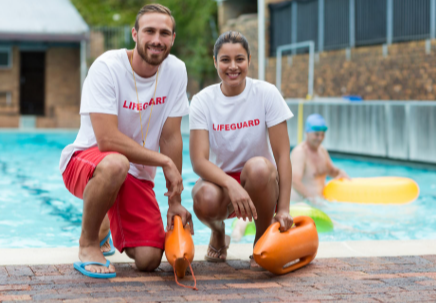Retiring as a Lifeguard: What You Need to Know About Lifeguard Recertification
It marks the end of an era when the lifeguard finally walks away from that kind of career. Whether you have spent years watching the beach, pool safety, or training future lifeguards, everything from active duty into retirement will involve a lot of consideration, especially with your certifications. Lifeguard recertification is even something you will want to consider, as it keeps your skills up-to-date, keeping your certification current should you ever want to do lifeguarding again.
In this article, we will explain what retiring lifeguards should know about lifeguard recertification, the importance of keeping their certifications current, and how organizations like the American Lifeguard Association offer resources to lifeguards at each step of their careers.
Why You Should Anytime Think About Lifeguard Recertification—Even If You Are Retired!
Lifeguarding is not only physically demanding and has an intense mental role, but it is also an ever-evolving profession that requires continual training. Most lifeguard certifications—like those from the American Lifeguard Association—need to be renewed every two years. While you may be eager to relax in retirement, there are still several ways it is advantageous to stay current on your recertification:
1. Keeping Your Options Available
Retirement does not always mean for good. Many lifeguards go back to work part-time (or full-time) or seasonal when the demand for lifeguards is high. By keeping your lifeguarding recertification current, you will be able to easily transition back to work without the hassles of having to retake the entire course.
2. Being Limitless in your Ability to Respond to Emergencies
Lifeguard skills—CPR, first aid, and water rescue skills—are great skills to have in everyday life. Keeping yourself current in these certifications, will keep open the opportunity to assist in emergency situations, whether that be at the leisure centre, the beach, or at a family barbeque.
3. Supporting Future Lifeguards
Retired lifeguards often find themselves working as trainers or supervisors. If you plan on teaching or mentoring new lifeguards, maintaining an active certification is usually a requirement for a trainer/instructor to do so.
The Lifeguard Recertification Process
While the recertification process can differ slightly by agency, most organizations follow a consistent structure. Here’s what to expect when renewing through the American Lifeguard Association or similar certifying agencies:
1. Check your certification expiration date
For most lifeguard certifications, the average expiration is two years. Mark your calendar a few months before your expiration date to allow for renewal.
2. Take a recertification course
Lifeguard recertification courses are shorter than initial training and the focus is mainly on the refreshment of core skill sets. These generally include:
CPR/AED and First Aid Review
Rescue Technique Drills
Scenario-based training
3. Complete the written exam and practical exam
Similar to the initial certification, there is a written exam and skills evaluation exam.
4. Submit required documentation
Make sure all paperwork is submitted to the certifying agency (American Lifeguard Association) to complete the process and receive your updated credentials.
See Also: How Technology Has Changed the Music Industry
Options for Full Recertification
If you are retiring and will not return to active lifeguarding (voluntary or paid), you may want to consider additional options to stay engaged (if you like) without going through full recertification:
1. First Aid/CPR Certification only
Many organizations offer individual CPR and first aid courses. To stay engaged your emergency response skills will be fresh, but you will not have to go through full aquatics training.
2. Volunteering
Some swimming and aquatic facilities and community programs may accept retired lifeguards in a volunteer capacity to meet their aquatics program goals in dropping numbers and/or budget. You may not need full certification but would need to obtain basic first aid training.
3. Lifeguard Instructor Certification
If you have a lot of experience, you can become a lifeguard instructor and train recruits without having to recertify.
The American Lifeguard Association’s Role in Helping Lifeguards Going into Retirement
The American Lifeguard Association is one of the dominant, North American organizations providing lifeguard training and recertification in North America. The Association delivers a range of options to lifeguards at any stage in their career, including access to opportunities for those moving into retirement:
Regular Recertification Courses – These shortened refresher courses make it more achievable for full-time, semi-retired or retired lifeguards to maintain their recertification.
Instructor Pathways – Experienced lifeguards can transition into the instructor realm, working with the next generation of new water safety professionals.
Continued Resources – Lifeguards will have access to training materials and resources even in retirement for updates on best practices for training and recertification.
Final Thoughts: Charting Your Lifeguarding Legacy
Retiring from lifeguarding is certainly a reason to be proud, not an end to your water safety efforts. Whether that means staying recertified, starting to look into training capacities, or simply wanting to keep your emergency response skills at peak readiness you have an abundance of experience!
The lifeguard recertification is a way to ensure that your skill set remains credentialed, and ready to respond in a time of emergency. There are organizations, such as the American Lifeguard Association, that are here to help you recertify your lifeguard credentials and enjoy the process of moving on from a lifeguarding role, or moving on but staying connected to the lifeguarding family!
So if you’ve identified that you are close to retirement, you should assess your recertification options, and it is likely the best possible exit point after your years of service!
Are you interested in learning more about lifeguard recertificationor transitioning to training capacities? Let us know in the comments!






